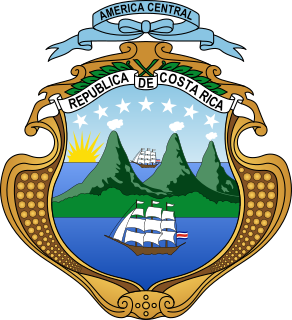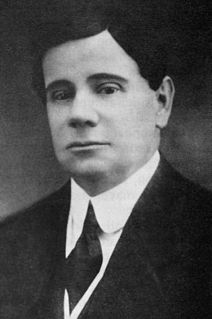
The politics of Costa Rica take place in a framework of a presidential, representative democratic republic, with a multi-party system. Executive power is exercised by the president and their cabinet, and the President of Costa Rica is both the head of state and head of government. Legislative power is vested in the Legislative Assembly. The president and 57 Legislative Assembly deputies are elected for four-year terms. The judiciary operates independent of the executive and the legislature but remains involved in the political process. Costa Rica is a republic with a strong system of constitutional checks and balances. Voting is compulsory in Costa Rica but it is not enforced.

The National Liberation Party, nicknamed the verdiblancos, is a political party in Costa Rica. The party is a member of the Socialist International. Social-democratic by statute, the party has a few internal factions, including liberals, Third Way supporters and centrists, as well as some social conservatives.

The Legislative Assembly forms the unicameral legislative branch of the Costa Rican government. The national congress building is located in the capital city, San José, specifically in Carmen district of the San José canton.

The Costa Rican Civil War was a civil war in Costa Rica from 12 March to 24 April 1948. The conflict began after the Legislative Assembly of Costa Rica, dominated by pro-government representatives, voted on 1 March 1948 to annul the results of the presidential elections of 8 February, alleging that the triumph of opposition candidate Otilio Ulate over the ruling party's Rafael Ángel Calderón Guardia had been achieved by fraud. This triggered an armed uprising led by José Figueres Ferrer, a businessman who had not participated in the elections, against the government of President Teodoro Picado.
The name Constitutional was used for several loosely connected Costa Rican parties throughout history.

General elections were held in Costa Rica on 14 February 1932. Ricardo Jiménez Oreamuno of the Independent National Republican Party won the presidential election, whilst the party also won the parliamentary election, in which they received 46.7% of the vote. Voter turnout was 64.2%.

General elections were held in Costa Rica on 26 July 1953, José Figueres Ferrer of the National Liberation Party won the presidential election, whilst his party also won the parliamentary election. Voter turnout was 67.2 percent in the presidential election and 67.5 percent in the parliamentary election. Local elections were also held.

General elections were held in Costa Rica on 4 February 1962. Francisco Orlich Bolmarcich of the National Liberation Party won the presidential election, whilst his party also won the parliamentary election. Voter turnout was 80.9%.

General elections were held in Costa Rica on 5 February 1978. Rodrigo Carazo Odio of the Unity Coalition won the presidential election, whilst his party also won the parliamentary election. Voter turnout was 81.3%.

General elections were held in Costa Rica on 7 February 1982. Luis Alberto Monge of the National Liberation Party won the presidential election, whilst his party also won the parliamentary election. Voter turnout was 78.6%.

The National Republican Party was a political party in Costa Rica.

The Social Christian Republican Party is a Costa Rican political party founded in 2014 by former president Rafael Ángel Calderón Fournier and his group of supporters as a splinter from the historical Social Christian Unity Party (PUSC). The party also uses the colors and a similar name of Calderón's father's party, the National Republican Party.
Costa Rican nationalism is the nationalist vision of the cultural and national identity of Costa Rica. According to scholars such as Tatiana Lobo, Carmen Murillo and Giovanna Giglioli, Costa Rican nationalism is based on two main myths; rural democracy since colonial times and the racial (white) "purity" of the Central Valley as the cradle of Costa Rican society.

Liberalism in Costa Rica is a political philosophy with a long and complex history. Liberals were the hegemonic political group for most of Costa Rica's history especially during the periods of the Free State and the First Republic, however, as the liberal model exhausted itself and new more left-wing reformist movements clashed during the Costa Rican Civil War liberalism was relegated to a secondary role after the Second Costa Rican Republic with the development of Costa Rica's Welfare State and its two-party system controlled by social-democratic and Christian democratic parties.

The Political Constitution of Costa Rica of 1917 was a constitution that was in force for two years; from 1917 to 1919. It was promulgated by then dictator Federico Tinoco Granados after the coup d'état that overthrew Alfredo González Flores in 1917. It was drafted by the ex-presidents Bernardo Soto Alfaro, Rafael Iglesias Castro, Ascensión Esquivel Ibarra, Cleto González Víquez and Carlos Durán Cartín. The presidents José Joaquín Rodríguez Zeledón and Ricardo Jiménez Oreamuno were invited to participate in the process as others of their status, but they refused to do so with various excuses.

The Founding Junta of the Second Republic was a de facto government which existed in the Republic of Costa Rica from May 8, 1948 to November 8, 1949, with the overthrow of the constitutional president Teodoro Picado Michalski, by a group of revolutionaries headed by José Figueres Ferrer.

The dictatorship of the Tinoco Brothers, also Tinochist or Peliquist Dictatorship, or Tinoco regime is the period of Costa Rica in which the military dictatorship led by Federico Tinoco Granados as de facto president and his brother José Joaquín Tinoco Granados as Minister of War was in place. It began after the 1917 Costa Rican coup d'état on January 27, 1917 and culminated with the departure of Tinoco from Costa Rica to France on August 13, 1919 three days after the murder of his brother and after a series of armed insurrections and massive civil protests known as the Sapoá Revolution and the 1919 student civic movement.

Calderonism or Calderonismo is a political and ideological doctrine of Costa Rica, which emerged in the 1940s under the leadership of caudillo Dr. Rafael Ángel Calderón Guardia, before, during and after he was president with his National Republican Party, and which was continued by various political forces such as Unity Coalition, National Unification Party and the current Social Christian Unity Party and its split the Social Christian Republican Party. It is together with Liberacionismo one of the two traditional political tendencies of Costa Rican politics, with which it represented a certain type of Costa Rican bipartisanship from 1986 to 2002 and revolves around the Calderón family. It is a form of populist and Catholic Christian socialism very similar to Argentine Peronism.










